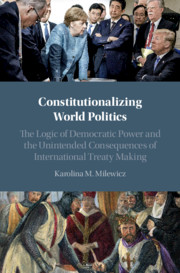 Constitutionalizing World Politics
Constitutionalizing World Politics Book contents
- Constitutionalizing World Politics
- Constitutionalizing World Politics
- Copyright page
- Dedication
- Contents
- Figures
- Tables
- Acknowledgments
- Abbreviations
- 1 Constitutionalization of World Politics – Seriously?
- Part I Constitutional Foundations
- 2 Constitutional Elements
- 3 National Constitutionalization
- 4 International Constitutionalization
- Part II The Logic of Democratic Power in Treaty Making
- Book part
- Bibliography
- Index
4 - International Constitutionalization
from Part I - Constitutional Foundations
Published online by Cambridge University Press: 21 July 2020
- Constitutionalizing World Politics
- Constitutionalizing World Politics
- Copyright page
- Dedication
- Contents
- Figures
- Tables
- Acknowledgments
- Abbreviations
- 1 Constitutionalization of World Politics – Seriously?
- Part I Constitutional Foundations
- 2 Constitutional Elements
- 3 National Constitutionalization
- 4 International Constitutionalization
- Part II The Logic of Democratic Power in Treaty Making
- Book part
- Bibliography
- Index
Summary
Operating against anarchy rather than hierarchy, international constitutionalization is a highly contested but unintended political process. It is a by–product of international treaty making, which is intended to create fairly specialized rules within issue–specific domains. Approximating the evolutionary pathway, this process nonetheless generates a less unified international constitutional framework than in the national setting. An examination of international constitutional developments (along the five core constitutional elements) reveals that formalization of international rules through treaties has become standard in the post–1945 period. Sovereignty has developed into the fundamental international principle, extending the circle of members to include newly emerging states. Relations among states have deepened to enhance inter–state cooperation, and rights and duties have further reproduced inequalities among states. The chapter concludes by stressing the inadvertent constitutional consequences of international treaty making, which leads to the constitutionalization trap.
Keywords
- Type
- Chapter
- Information
- Constitutionalizing World PoliticsThe Logic of Democratic Power and the Unintended Consequences of International Treaty Making, pp. 117 - 156Publisher: Cambridge University PressPrint publication year: 2020


